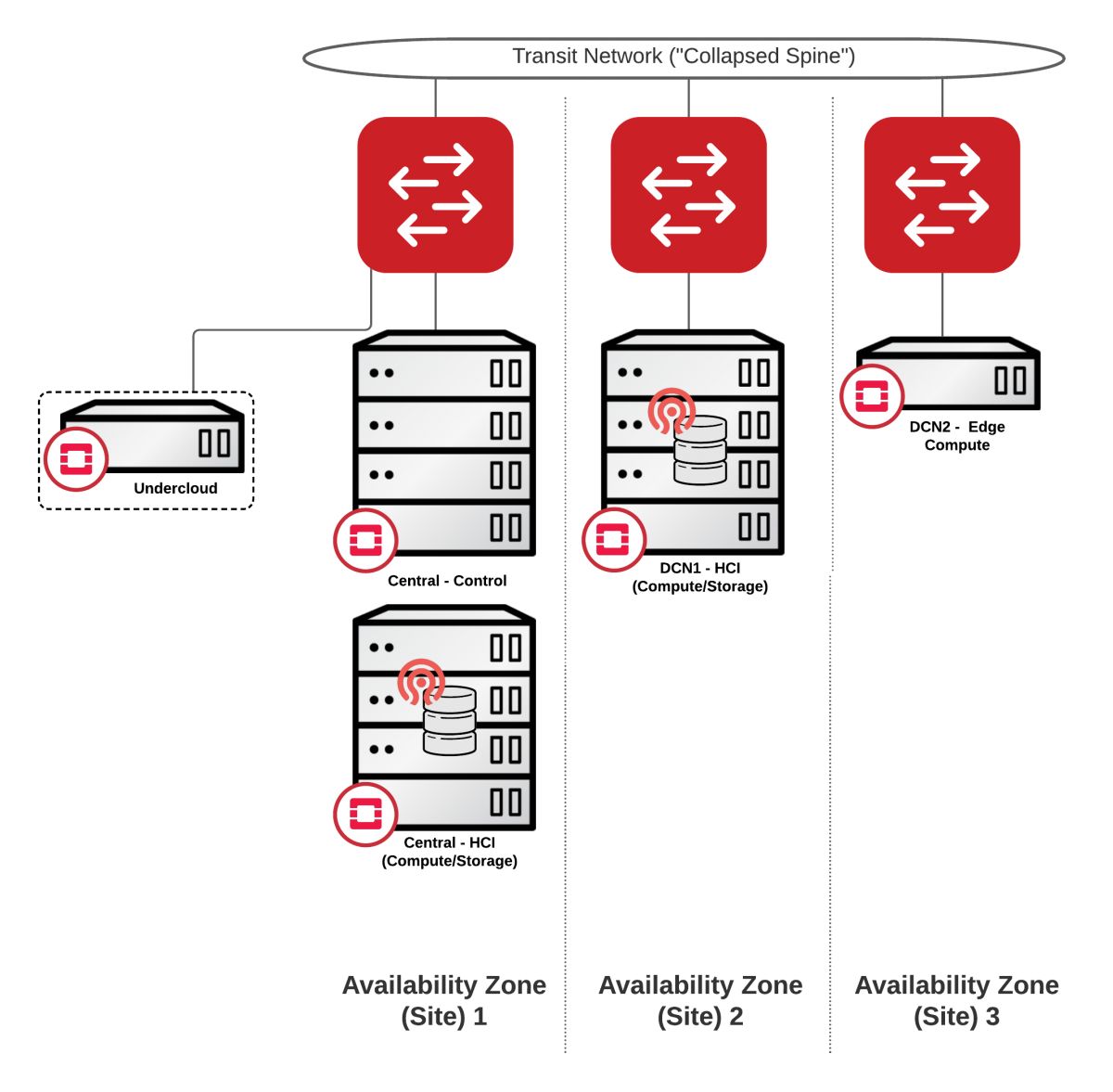I have hesitated to post anything about Red Hat OpenStack Edge since it got introduced in OSP13 simply because I found it quite difficult to consume. Also the storage situation back then was .. not complete. Things improved overtime and now with OSP16.1 we can deploy our private cloud with the following features (which imho finally makes it production ready.):
– ceph storage at the edge / dcn
– one stack per site for better management and lifecycle
– improved routed networking configuration
– image caching at the edge
So why would anyone do this? I find 3 distinctive benefits:
1. Simplified Management and Lifecycle – of rather complex architectures
2. Efficiency of distributed compute/storage and no control overhead
3. High availability and high performance at the edge
And for once, I don’t know of any other Infrastructure software that could do it in a supportable way.
Demo:
So now we know why. Let’s focus on how.
I. Official Documents
I have been referencing 3 separate documents to come out with my architecture:
DCN Docs:
Leaf Spine Docs:
Upstream DCN Docs:
II. Relevant artifacts from my lab:
1. Deployment scripts:
(undercloud) [stack@chrisj-dcn2-undercloud ~]$ cat deploy-central.sh
#!/bin/bash
source ~/stackrc
cd ~/
time openstack overcloud deploy –templates –stack chrisjdcn-central \
-n templates/network_data_spine_leaf.yaml \
-r templates/central_roles.yaml \
-e /usr/share/openstack-tripleo-heat-templates/environments/ceph-ansible/ceph-ansible.yaml \
-e /usr/share/openstack-tripleo-heat-templates/environments/network-isolation.yaml \
-e /usr/share/openstack-tripleo-heat-templates/environments/network-environment.yaml \
-e /usr/share/openstack-tripleo-heat-templates/environments/services/neutron-ovs.yaml \
-e templates/node-info.yaml \
-e templates/ceph-custom-config.yaml \
-e templates/network-environment.yaml \
-e templates/spine-leaf-ctlplane.yaml \
-e templates/spine-leaf-vips.yaml \
-e templates/host-memory.yaml \
-e templates/site-name.yaml \
-e templates/inject-trust-anchor-hiera.yaml \
-e templates/containers-prepare-parameter.yaml \
-e templates/glance_update.yaml \
-e templates/dcn_ceph.yaml \
–log-file chrisj-dcn_deployment.log \
–ntp-server 10.10.0.10
(undercloud) [stack@chrisj-dcn2-undercloud ~]$ cat deploy-dcn1.sh
#!/bin/bash
source ~/stackrc
cd ~/
time openstack overcloud deploy –templates –stack chrisj-dcn1 \
-n templates/network_data_spine_leaf.yaml \
-r templates/dcn1/dcn1_roles.yaml \
-e /usr/share/openstack-tripleo-heat-templates/environments/ceph-ansible/ceph-ansible.yaml \
-e /usr/share/openstack-tripleo-heat-templates/environments/network-isolation.yaml \
-e /usr/share/openstack-tripleo-heat-templates/environments/network-environment.yaml \
-e /usr/share/openstack-tripleo-heat-templates/environments/services/neutron-ovs.yaml \
-e /usr/share/openstack-tripleo-heat-templates/environments/dcn-hci.yaml \
-e templates/host-memory.yaml \
-e templates/dcn1/site-name.yaml \
-e dcn-common/central-export.yaml \
-e dcn-common/central_ceph_external.yaml \
-e templates/dcn1/tuning.yaml \
-e templates/dcn1/glance.yaml \
-e templates/inject-trust-anchor-hiera.yaml \
-e templates/containers-prepare-parameter.yaml \
-e templates/dcn1/dcn1-images-env.yaml \
-e templates/dcn1/node-info.yaml \
-e templates/dcn1/ceph.yaml \
-e templates/network-environment.yaml \
-e templates/spine-leaf-ctlplane.yaml \
-e templates/spine-leaf-vips.yaml \
–log-file chrisj-dcn_deployment.log \
–ntp-server 10.10.0.10
(undercloud) [stack@chrisj-dcn2-undercloud ~]$ cat deploy-dcn2.sh
#!/bin/bash
#############################
# This is not fully dynamic file and it might have not been populated with all right information. This is a template. You might still want to verify this is what you want before executing it
##############################
source ~/stackrc
cd ~/
time openstack overcloud deploy –templates –stack chrisj-dcn2 \
-n templates/network_data_spine_leaf.yaml \
-r templates/dcn2/dcn2_roles.yaml \
-e /usr/share/openstack-tripleo-heat-templates/environments/network-isolation.yaml \
-e /usr/share/openstack-tripleo-heat-templates/environments/network-environment.yaml \
-e /usr/share/openstack-tripleo-heat-templates/environments/services/neutron-ovs.yaml \
-e templates/dcn2/site-name.yaml \
-e dcn-common/central-export.yaml \
-e templates/inject-trust-anchor-hiera.yaml \
-e templates/containers-prepare-parameter.yaml \
-e templates/dcn2/node-info.yaml \
-e templates/network-environment.yaml \
-e templates/spine-leaf-ctlplane.yaml \
-e templates/spine-leaf-vips.yaml \
–log-file chrisj-dcn2_deployment.log \
–ntp-server 10.10.0.10
2. Central location yaml files
(undercloud) [stack@chrisj-dcn2-undercloud templates]$ cat node-info.yaml
parameter_defaults:
OvercloudControllerFlavor: control
OvercloudComputeFlavor: compute
OvercloudComputeLeaf1Flavor: compute-leaf1
OvercloudComputeLeaf2Flavor: compute-leaf2
ComputeLeaf1Count: 0
ComputeLeaf2Count: 0
ControllerCount: 3
ComputeCount: 3
(undercloud) [stack@chrisj-dcn2-undercloud templates]$ cat ceph-custom-config.yaml
parameter_defaults:
CephAnsibleDisksConfig:
devices:
– /dev/vdb
osd_scenario: lvm
osd_objectstore: bluestore
CephPoolDefaultPgNum: 16
CephPoolDefaultSize: 1
CephClusterName: central
CephAnsibleExtraConfig:
public_network: ‘10.40.0.0/24,10.40.1.0/24’
cluster_network: ‘10.50.0.0/24,10.50.1.0/24’
GlanceEnabledImportMethods: web-download,copy-image
GlanceBackend: rbd
GlanceStoreDescription: ‘central rbd glance store’
GlanceBackendID: central
CephClusterName: central
(undercloud) [stack@chrisj-dcn2-undercloud templates]$ cat network-environment.yaml
resource_registry:
OS::TripleO::Compute::Net::SoftwareConfig:
./nic-config/compute-hci.yaml
OS::TripleO::ComputeLeaf1::Net::SoftwareConfig:
./nic-config/compute-hci-leaf1.yaml
OS::TripleO::ComputeLeaf2::Net::SoftwareConfig:
./nic-config/compute-leaf2.yaml
OS::TripleO::Controller::Net::SoftwareConfig:
./nic-config/controller.yaml
OS::TripleO::CephStorage::Net::SoftwareConfig:
./nic-config/ceph-storage.yaml
parameter_defaults:
DnsServers: [“10.9.71.7″,”8.8.8.8”]
NeutronFlatNetworks: ‘datacentre,provider0,provider1,provider2’
ControllerParameters:
NeutronBridgeMappings: “datacentre:br-ex,provider0:br-provider”
ComputeParameters:
NeutronBridgeMappings: “provider0:br-provider”
ComputeLeaf1Parameters:
NeutronBridgeMappings: “provider1:br-provider”
ComputeLeaf2Parameters:
NeutronBridgeMappings: “provider2:br-provider”
BondInterfaceOvsOptions: “bond_mode=active-backup”
TimeZone: ‘US/Eastern’
NtpServer: 10.10.0.10
NeutronEnableIsolatedMetadata: true
(undercloud) [stack@chrisj-dcn2-undercloud templates]$ cat spine-leaf-ctlplane.yaml
parameter_defaults:
ControllerControlPlaneSubnet: leaf0
ComputeControlPlaneSubnet: leaf0
ComputeLeaf1ControlPlaneSubnet: leaf1
ComputeLeaf2ControlPlaneSubnet: leaf2
(undercloud) [stack@chrisj-dcn2-undercloud templates]$ cat spine-leaf-vips.yaml
parameter_defaults:
VipSubnetMap:
ctlplane: leaf0
(undercloud) [stack@chrisj-dcn2-undercloud templates]$ cat site-name.yaml
parameter_defaults:
NovaComputeAvailabilityZone: central
ControllerExtraConfig:
nova::availability_zone::default_schedule_zone: central
NovaCrossAZAttach: false
CinderStorageAvailabilityZone: central
GlanceBackendID: central
3. DCN1 location yaml files
(undercloud) [stack@chrisj-dcn2-undercloud templates]$ cat dcn1/ceph.yaml
parameter_defaults:
CephAnsibleDisksConfig:
devices:
– /dev/vdb
osd_scenario: lvm
osd_objectstore: bluestore
CephPoolDefaultPgNum: 16
CephPoolDefaultSize: 1
CephClusterName: dcn1
(undercloud) [stack@chrisj-dcn2-undercloud templates]$ cat dcn1/glance.yaml
parameter_defaults:
GlanceEnabledImportMethods: web-download,copy-image
GlanceBackend: rbd
GlanceStoreDescription: ‘dcn1 rbd glance store’
GlanceBackendID: dcn1
GlanceMultistoreConfig:
central:
GlanceBackend: rbd
GlanceStoreDescription: ‘central rbd glance store’
CephClientUserName: ‘openstack’
CephClusterName: central
(undercloud) [stack@chrisj-dcn2-undercloud templates]$ cat dcn1/node-info.yaml
parameter_defaults:
ControllerCount: 0
ComputeCount: 0
OvercloudControllerFlavor: control
OvercloudComputeFlavor: compute
OvercloudComputeLeaf1Flavor: compute-leaf1
OvercloudComputeLeaf2Flavor: compute-leaf2
ComputeLeaf1Count: 3
ComputeLeaf2Count: 0
(undercloud) [stack@chrisj-dcn2-undercloud templates]$ cat dcn1/site-name.yaml
parameter_defaults:
NovaComputeAvailabilityZone: dcn1
NovaCrossAZAttach: false
CinderStorageAvailabilityZone: dcn1
CinderVolumeCluster: dcn1
ComputeLeaf1ExtraConfig:
neutron::agents::dhcp::availability_zone: ‘dcn1’
4. DCN2 location yaml files
(undercloud) [stack@chrisj-dcn2-undercloud templates]$ cat dcn2/node-info.yaml
parameter_defaults:
ControllerCount: 0
ComputeCount: 0
OvercloudControllerFlavor: control
OvercloudComputeFlavor: compute
OvercloudComputeLeaf1Flavor: compute-leaf1
OvercloudComputeLeaf2Flavor: compute-leaf2
ComputeLeaf1Count: 0
ComputeLeaf2Count: 1
(undercloud) [stack@chrisj-dcn2-undercloud templates]$ cat dcn2/site-name.yaml
parameter_defaults:
NovaComputeAvailabilityZone: dcn2
NovaCrossAZAttach: false
RootStackName: dcn2
ManageNetworks: false
ComputeLeaf2ExtraConfig:
neutron::agents::dhcp::availability_zone: ‘dcn2’
5. YAML files added to central location post DCN deployment
(undercloud) [stack@chrisj-dcn2-undercloud templates]$ cat glance_update.yaml
parameter_defaults:
GlanceEnabledImportMethods: web-download,copy-image
GlanceBackend: rbd
GlanceStoreDescription: ‘central rbd glance store’
GlanceBackendID: central
CephClusterName: central
GlanceMultistoreConfig:
dcn1:
GlanceBackend: rbd
GlanceStoreDescription: ‘dcn1 rbd glance store’
CephClientUserName: ‘openstack’
CephClusterName: dcn1
GlanceBackendID: dcn1
(undercloud) [stack@chrisj-dcn2-undercloud templates]$ cat dcn_ceph.yaml
parameter_defaults:
CephExternalMultiConfig:
– ceph_conf_overrides:
client:
keyring: /etc/ceph/dcn1.client.openstack.keyring
cluster: dcn1
dashboard_enabled: false
external_cluster_mon_ips: 10.40.1.82,10.40.1.141,10.40.1.158
fsid: secret
keys:
– caps:
mgr: allow *
mon: profile rbd
osd: profile rbd pool=vms, profile rbd pool=volumes, profile rbd pool=images
key: secret
mode: ‘0600’
name: client.openstack
III. Summary
I must admit that I had a lot of fun exploring the Edge/DCN capabilities in OSP 16.1. Getting to the MVP was not easy mostly due to lack of or incomplete documentation, but once I got it fully up it was “no brainer” to add or adjust it’s features.
I hope this additional documentation helps someone get it up in their private cloud. It’s definitely worth the try.

